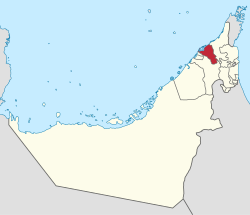
Back Umm Al Quwain ANG إمارة أم القيوين Arabic Emiratu d'Umm al-Qaywayn AST Ум-эль-Кайвайн (эмірат) Byelorussian Ум ал-Куейн Bulgarian উম্ম আল কোয়াইন আমিরাত Bengali/Bangla Umm al-Qaywayn Breton Umm al-Quwain (emirat) BS Umm al-Qaiwain Catalan Umm al Qaywayn (emirato) CEB
Umm Al Quwain
إِمَارَة أم القيوين | |
|---|---|
 Location of Umm Al Quwain in the UAE | |
| Coordinates: 25°59′11″N 55°56′24″E / 25.98639°N 55.94000°E | |
| Country | |
| Seat | Umm Al Quwain |
| Government | |
| • Type | Islamic absolute monarchy within a federation |
| • Ruler | Saud bin Rashid Al Mualla |
| • Crown Prince | Rashid bin Saud bin Rashid Al Mualla |
| Area | |
| • Metro | 755 km2 (292 sq mi) |
| • Rank | 6th |
| Population (2007) | |
| • Rank | 7th |
| • Metro | 72,000 |
| GDP | |
| • Total | US$ 0.7 billion (2023) |
| • Per capita | US$ 7,700 (2023) |
| Time zone | UTC+4 (UAE Standard Time) |
The Emirate of Umm Al Quwain (UAQ; Arabic: أم القيوين; pronounced [ʔumː alqejˈwejn]) is one of the seven constituent emirates of the United Arab Emirates,[2][3][4] located in the north of the country. It is the second smallest and least populous emirate in the UAE[3][5][4][6] and borders the Persian Gulf. Umm Al Quwain lies between Ras Al Khaimah and Sharjah/Ajman on the west coast.[7][8] It has a coastline stretching to 24 km (15 miles).[6][7][9] It had 72,000 inhabitants in 2007 and has an area of 770 km2 (300 sq mi).[10][4][8][11][9]
The Emirate of Umm Al Quwain was formed in 1775, when Sheikh Majid Al Mualla established it as an independent sheikhdom.[8] The emirate is now ruled by Saud bin Rashid Al Mualla. The current crown prince is Rashid bin Saud bin Rashid Al Mua'lla, and the deputy ruler is Abdullah bin Rashid Al Mualla III.
The emirate consists in the main of the coastal city of Umm Al Quwain and the inland oasis town of Falaj Al Mualla, some 30 km (19 miles) from the coast.[10][8] The Population of the Emirate is 49,159 according to the census of December 2005. The city of Umm Al Quwain is the capital of the Emirate.[7][5][12]
Unlike some of its neighbours, Umm Al Quwain has not made any significant find of oil or gas in its territory and depends on revenue from hotels, parks and tourism,[13] fisheries and general trading activities[14] as well as the Umm Al Quwain Free Zone (UAQFTZ)[15] based at Port Ahmed Bin Rashid.[6]
A number of government initiatives and strategies have been put in place to incentivise growth in trade and industrial activity in the emirate, including a 2018 move to reduce government fees to business and waive fines and violations levied against businesses which had not renewed their trade licenses.[16][6][17]
- ^ "TelluBase—UAE Fact Sheet (Tellusant Public Service Series)" (PDF). Tellusant. Retrieved 11 January 2024.
- ^ "48 interesting facts for the UAE's 48th National Day". gulfnews.com. 25 November 2019. Archived from the original on 25 November 2021. Retrieved 2 December 2019.
- ^ a b "Where on Earth is Umm al Qaiwain?". BBC News. 17 April 2015. Archived from the original on 21 September 2021. Retrieved 20 September 2021.
- ^ a b c "Umm al-Quwain". whichschooladvisor.com. Archived from the original on 25 November 2021. Retrieved 20 September 2021.
- ^ a b "Umm Al Quwain - The Official Portal of the UAE Government". u.ae. Archived from the original on 20 April 2020. Retrieved 20 September 2021.
- ^ a b c d "A Guide on Setting up a Business in Umm Al Quwain" (PDF). Archived (PDF) from the original on 20 September 2021. Retrieved 20 September 2021.
- ^ a b c "Emirate of Umm Al Quwain". www.ourallegiancetokhalifa.com. Archived from the original on 21 September 2021. Retrieved 21 September 2021.
- ^ a b c d "Emirate of Umm Al Quwain UAE - Tourist Information and Attractions". www.guide2dubai.com. Archived from the original on 21 September 2021. Retrieved 21 September 2021.
- ^ a b United Arab Emirates Land Ownership and Property Laws Handbook Volume 1 Strategic Information and Dubai Property Laws. International Business Publications USA. June 2015. ISBN 978-1-4387-6019-3. Archived from the original on 11 December 2022. Retrieved 11 December 2022.
- ^ a b Heard-Bey, Frauke (2005). From Trucial States to United Arab Emirates : a society in transition (1941-). London: Motivate. ISBN 978-1860631672. OCLC 64689681.
- ^ "Emirate of Umm Al Quwain". www.ourallegiancetokhalifa.com. Archived from the original on 21 September 2021. Retrieved 20 September 2021.
- ^ "Top 10 things to do in Umm Al Quwain: History, Sports & More | MyBayut". A blog about homes, trends, tips & life in the UAE | MyBayut. Archived from the original on 21 September 2021. Retrieved 20 September 2021.
- ^ "Umm Al Quwain - The Official Portal of the UAE Government". government.ae. Archived from the original on 24 July 2018. Retrieved 24 July 2018.
- ^ Nair, Manoj (7 April 2011). "Tourism and trade the top priorities in Umm Al Quwain". GulfNews. Archived from the original on 24 July 2018. Retrieved 24 July 2018.
- ^ "UAQ Free Trade Zone | Business Licences | Umm Al Quwain, Dubai, Sharjah, Abu Dhabi, Ajman & RAK :: uaq ftz". uaqftz.com. Archived from the original on 24 July 2018. Retrieved 24 July 2018.
- ^ Staff Report (5 May 2018). "Umm Al Quwain to slash cost of doing business in emirate". GulfNews. Archived from the original on 24 July 2018. Retrieved 24 July 2018.
- ^ "Umm Al Quwain Vision 2021 - The Official Portal of the UAE Government". u.ae. Archived from the original on 20 September 2021. Retrieved 20 September 2021.


